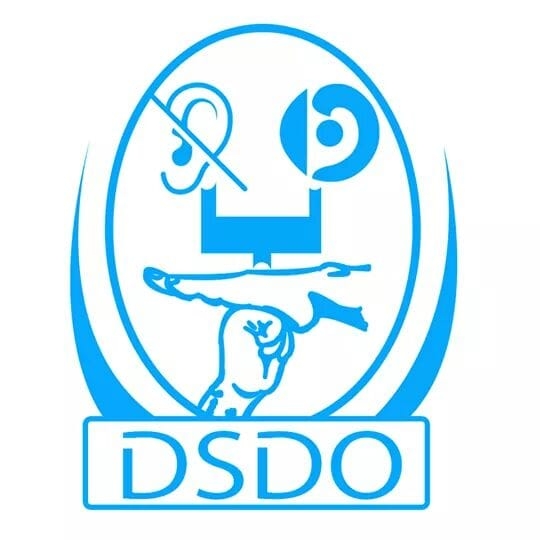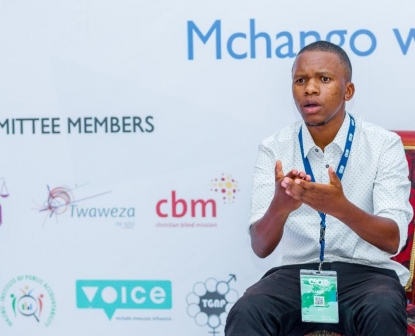Project
Let’s Go!
-
Amount Funded
50,000 EUROProject Duration
01 Mar 2021 - 31 Aug 2022 -
-
Lead organisation
Deaf’s Sustainance and Development Organisation (DSDO)
-
Deaf’s Sustenance and Development Organisation (DSDO) was found in 2016 and registered as a Non-Governmental Organisation (NGO) under the Non-governmental Organisations Act of 2002. DSDO was established to serve the interests of the most vulnerable and marginalised groups, mainly people with disabilities. The organisation’s goal is to improve the livelihood of the people they serve, by improving access to resources, social services, and participation.
Since its establishment, DSDO has worked with several stakeholders, including the Local Government, donors, and local partners. In the past five years, DSDO has worked in cooperation with other stakeholders in building the capacity of the deaf community in the Southern Highlands of Tanzania. DSDO has focused on improving skills, boosting economic status, raising awareness about human rights, and building the confidence of their rightsholders.
-
Organisation
Deaf’s Sustenance and Development Organisation (DSDO) was found in 2016 and registered as a Non-Governmental Organisation (NGO) under the Non-governmental Organisations Act of 2002. DSDO was established to serve the interests of the most vulnerable and marginalised groups, mainly people with disabilities. The organisation’s goal is to improve the livelihood of the people they serve, by improving access to resources, social services, and participation.
Since its establishment, DSDO has worked with several stakeholders, including the Local Government, donors, and local partners. In the past five years, DSDO has worked in cooperation with other stakeholders in building the capacity of the deaf community in the Southern Highlands of Tanzania. DSDO has focused on improving skills, boosting economic status, raising awareness about human rights, and building the confidence of their rightsholders.
-
Project
The Let’s Go! project has been designed to promote equal access to employment opportunities and resource endowments for people with disabilities in the Southern Highlands of Tanzania, through agriculture. The focus is on capacity building and skill development and linking them with markets, to engage in income-generating opportunities and self-reliance, thereby promoting their self-esteem.
The project also strives to end hunger and achieve food security for all, to ensure that everyone in society has access to sufficient, safe, and nutritious food to meet their dietary needs. Including persons with disabilities by boosting their food production, improve employment opportunities and income generation.
This initiative will be achieved through various strategic objectives, including facilitating the acquisition and accessibility of land; acquisition and accessibility to finance; acquisition of agricultural inputs; and linkage between persons with disabilities and other agriculture support services. Enhancing of marketing of agricultural products and promotion of technical and entrepreneurial skills for people with disabilities.
-
-
The Let’s Go! project has been designed to promote equal access to employment opportunities and resource endowments for people with disabilities in the Southern Highlands of Tanzania, through agriculture. The focus is on capacity building and skill development and linking them with markets, to engage in income-generating opportunities and self-reliance, thereby promoting their self-esteem.
The project also strives to end hunger and achieve food security for all, to ensure that everyone in society has access to sufficient, safe, and nutritious food to meet their dietary needs. Including persons with disabilities by boosting their food production, improve employment opportunities and income generation.
This initiative will be achieved through various strategic objectives, including facilitating the acquisition and accessibility of land; acquisition and accessibility to finance; acquisition of agricultural inputs; and linkage between persons with disabilities and other agriculture support services. Enhancing of marketing of agricultural products and promotion of technical and entrepreneurial skills for people with disabilities.
-
Introduction
In the picturesque regions of Iringa and Njombe, Tanzania, the Deaf’s Sustenance and Development Organization (DSDO) embarked on a transformative journey with the “Let’s Go” project. Launched on March 1, 2021, this initiative aimed to empower people with disabilities (PWDs), particularly the deaf community, by integrating them into the growing agricultural sector. The project focused on avocado farming, a vital economic activity in the Southern Highlands, while also promoting the cultivation of other crops. Over 18 months, DSDO sought to foster inclusion, enhance economic opportunities, and challenge societal norms around disability.Project Implementation
The “Let’s Go” project started with strong support from local government officials, who attended the initial meetings and pledged their assistance. This support was crucial, as it facilitated the project’s seamless integration into the local community. Within the first six months, DSDO established three groups of 30 deaf individuals—15 men and 15 women—out of the planned ten groups. These groups received critical support in the form of avocado seedlings and other agricultural inputs.A significant milestone was the establishment of an agro-input facility, designed to supply necessary resources to the community. This facility played a crucial role in ensuring that the rightsholders had access to quality inputs, which are vital for successful farming ventures. Additionally, DSDO successfully advocated for free land allocation by the government, allowing these groups to farm without the burden of land costs.
One of the most notable achievements was the successful lobbying for the inclusion of deaf individuals in the local government’s interest-free loan program. Historically, deaf people faced significant barriers in accessing these loans due to prevailing biases. However, DSDO’s efforts resulted in 30 deaf individuals from the three groups receiving these loans, allowing them to invest in their agricultural activities. This not only provided financial relief but also instilled a sense of trust and credibility within the community.
Impact and Transformation
The impact of the “Let’s Go” project extended beyond mere numbers. It sparked a transformation in how the local community and government perceive PWDs, especially the deaf. The involvement of 90 deaf rightsholders (55 men and 35 women) from outside the project’s geographical area underscored its widespread appeal and success. The project’s reach also included 13 people with other disabilities (5 men and 8 women) and 37 people without disabilities (21 women and 16 men), who played supportive roles.The establishment of three organized groups and their integration into local economic activities demonstrated a shift towards inclusivity and empowerment. The local government’s newfound trust in deaf individuals, evidenced by the provision of loans, marked a significant cultural shift. This change was not only a financial benefit but also a strong statement against the stigma and discrimination PWDs often face.
DSDO’s efforts led to a noticeable increase in the involvement of PWDs in agriculture. The introduction of avocado farming provided a sustainable income source, while the cultivation of short-term crops like maize, peas, beans, and tomatoes addressed immediate food security needs. These activities contributed to the overall well-being and economic stability of the rightsholders, fostering a sense of self-reliance and dignity.
Lessons Learned
The journey of the “Let’s Go” project was rich with lessons. One key insight was the power of community and government collaboration in driving change. The project’s success relied on the active participation of rightsholders, local authorities, and community members. Another critical lesson was the importance of capacity building. DSDO recognized the need to improve financial reporting and documentation, as these areas posed challenges during the project’s implementation. The organization also noted the importance of media outreach and public visibility in amplifying its impact and successes.Conclusion
The story of DSDO and the “Let’s Go” project is one of resilience, innovation, and transformation. It serves as a powerful reminder that with the right support, marginalized communities can overcome barriers and thrive. The project’s success in advocating for PWDs’ rights and inclusion in economic activities serves as a beacon of hope for other organizations and communities. It highlights the potential of grassroots initiatives to bring about meaningful change, even in the face of significant challenges like inflation and social stigma.
The “Let’s Go” project stands as a testament to the potential for empowerment and inclusion within the PWD community. By establishing farming groups, providing essential resources, and successfully advocating for government support, DSDO has created a sustainable model for economic and social empowerment. As the project concludes, the focus shifts towards ensuring the sustainability of these efforts and further enhancing the capacity of the rightsholders. The journey has only just begun, and the seeds of change planted by DSDO will continue to grow, fostering a more inclusive and equitable society.
As DSDO looks to the future, the organization is committed to building on the successes of the “Let’s Go” project. By strengthening documentation practices and enhancing public outreach, DSDO aims to share their stories and inspire broader change. The continued support from Voice and other partners will be crucial in sustaining these efforts and expanding their impact. Together, they will continue empowering the deaf community and other PWDs, ensuring their voices are heard and their potential realized.
- News




